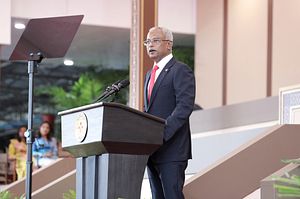On Saturday, the Ibrahim ‘Ibu’ Mohamed Solih was sworn in as the new president of the Maldives, marking the successful completion of an uncertain power transition from his authoritarian-leaning predecessor, Abdulla Yameen.
During his inaugural address, Solih outlined priorities for the first hundred days of his presidential tenure, focusing primarily on domestic priorities including a reduction in energy prices, college tuition, and public spending priorities.
On foreign policy, Solih said that he would work to “fortify” Male’s existing relationship with India, which had grown strained under Yameen, but has historically been strong.
Solih delivered the remarks in the presence of Indian Prime Minister Narendra Modi, who made his first trip to the Maldives for the inauguration. The trip marked the completion of visits by Modi to all countries in India’s immediate neighborhood.
Ahead of his trip to Male for the inauguration, Modi noted in a statement that he would convey “the desire of my Government to work closely for realisation of their developmental priorities, especially in areas of infrastructure, health care, connectivity and human resource development.”
Modi and Solih met after the inauguration on Saturday, with Solih asking for Indian assistance on infrastructure development in the country.
The geopolitical overtones of the change in leadership in the Maldives were clear during the inaugural address, when Solih referenced the cause for the government’s poor fiscal state as the previous’ government’s decision to pursue “reckless mega development projects undertaken purely for political gains.”
Yameen took on major loans from China, which may add up to as much as $3 billion. Additionally, in late-2017, Yameen caught the opposition off-guard by pushing through the ratification of a free trade agreement that had been secretly negotiated with Beijing.
During his meeting with Modi, Solih raised the “dire economic situation facing the country as he takes office,” according to an India-Maldives joint statement
“Large-scale embezzlement and corruption have dwindled the coffers of the state by billions of rufiyaa. This money belongs to the Maldivian people, money that should have been spent for the common good of the people,” Solih added.
Solih went on to underline his priorities on climate change. The Maldives is acutely threatened by rising global sea levels.
“I intend to spearhead environmental protection programs that adhere to international conventions, to protect selected islands, reefs and seas in every atoll. The development I envisage for the Maldives, is green and sustainable,” Solih noted.
“The Maldives will further consolidate its global position as a leader in climate action amongst Small Island Developing States, and will strive to become the leading advocate for this cause. ”
Solih won victory in the country’s September 23 presidential election, which saw exceptionally high turnout. Though Yameen asked the country’s judiciary to overturn the result of that election, the courts refused and Solih’s victory remained in place.

































